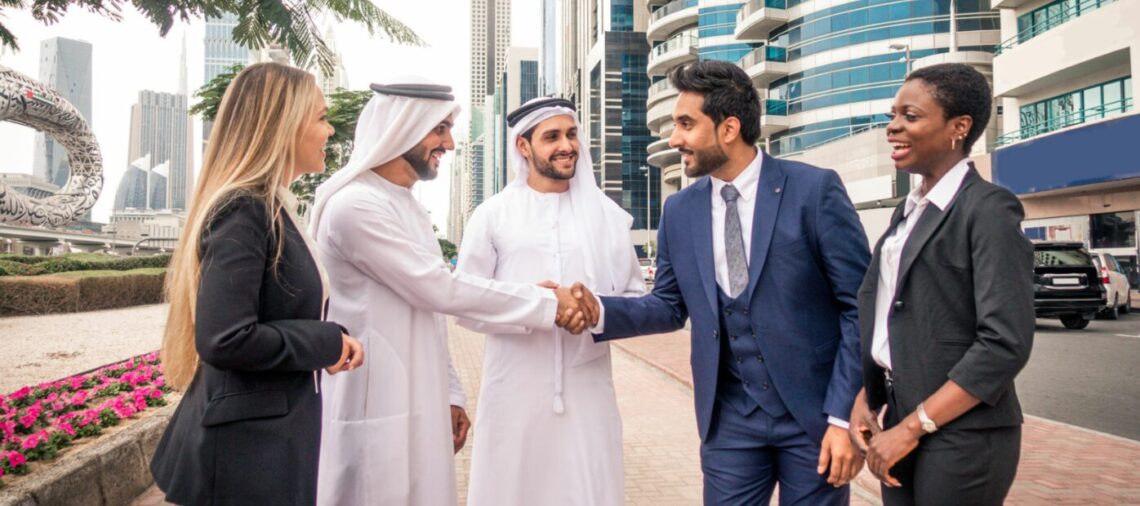You may think that cultural etiquette in Dubai is a complicated and overwhelming topic to navigate. However, understanding local customs and how to respect them is essential for anyone visiting or living in this vibrant city.
By familiarizing yourself with the cultural norms, you can ensure that you make a positive impression and avoid any unintentional offense. From dress code to dining etiquette, greetings to religious practices, and even professional conduct, there are various aspects to consider.
So, let’s explore the rich tapestry of cultural etiquette in Dubai and discover how to embrace and respect the local customs, ensuring a harmonious and enjoyable experience.
Dress Code in Dubai

When visiting Dubai, it is important to be mindful of the dress code in order to respect the local culture and customs. Dubai is a city that values modesty and traditional clothing, and it is important to dress appropriately to avoid any potential offense or disrespect.
While the dress code in Dubai is not as strict as in some other Middle Eastern countries, it is still important to dress modestly.
Women should avoid wearing revealing or tight-fitting clothing, and should cover their shoulders and knees.
Men should also dress modestly, avoiding shorts or sleeveless shirts in public places.
Greetings and Communication in Dubai

To continue navigating cultural etiquette in Dubai, it is essential to understand the proper greetings and communication norms followed in the city.
When greeting someone in Dubai, it is customary to start with a warm handshake, followed by a respectful greeting such as “Salam alaykum” (peace be upon you).
It is important to note that public displays of affection, such as hugging or kissing, are not common in Dubai and should be avoided.
Non-verbal communication is also significant in Dubai, with locals valuing personal space. It is important to maintain a respectful distance during conversations and avoid touching someone unless given permission.
Additionally, it is considered respectful to use proper titles and last names when addressing someone, unless invited to use their first name.
Dining Etiquette in Dubai

Dining etiquette in Dubai encompasses a range of cultural customs and practices. When dining in Dubai, it is important to be aware of the local table manners and food customs to show respect to the host and the culture.
One key aspect of dining etiquette in Dubai is the use of the right hand for eating. It is considered impolite to use the left hand, as it is traditionally associated with personal hygiene.
Additionally, it is customary to accept food and drinks with the right hand as a sign of respect.
Another important aspect is to wait for the host or the eldest person at the table to start eating before you begin. This shows proper manners and respect towards the host.
It is also polite to compliment the food and express your appreciation for the meal.
Lastly, it is common to leave a small amount of food on your plate to show that you have been satisfied.
Public Behavior and Social Etiquette in Dubai

As you continue to navigate the cultural etiquette in Dubai, it is important to be aware of the expectations surrounding public behavior and social etiquette.
Personal space is highly valued in Dubai, so it is crucial to respect the personal boundaries of others.
Avoid standing too close or touching someone without their permission.
Additionally, non-verbal communication plays a significant role in social interactions. It is essential to be mindful of your body language and gestures. Maintain eye contact when speaking, as it demonstrates respect and attentiveness. However, prolonged eye contact may be considered intrusive, so strike a balance.
It is also customary to greet others with a handshake, but be aware that some locals may prefer not to shake hands with the opposite sex.
Religious Customs and Practices in Dubai

Religious customs and practices are deeply rooted in the culture of Dubai, shaping the daily lives and interactions of its residents. Dubai is an Islamic country, and Islam plays a significant role in the lives of its people.
One important aspect of religious customs is the celebration of religious festivals. These festivals, such as Eid al-Fitr and Eid al-Adha, are joyous occasions and are usually marked by special prayers, feasts, and family gatherings.
Another important religious practice in Dubai is mosque etiquette. When visiting a mosque, it is essential to dress modestly, with women covering their heads and men wearing long pants.
It is also customary to remove your shoes before entering the mosque and to be respectful and quiet during prayer times.
Business Etiquette in Dubai

Moving from the discussion of religious customs and practices, it is important to explore the crucial topic of business etiquette and professionalism in Dubai.
Understanding the proper office behavior and meeting etiquette is essential for success in the business world. In Dubai, punctuality is highly valued, so it is important to arrive on time for meetings and appointments.
Dressing professionally is also important, with men typically wearing suits and women opting for conservative attire.
During meetings, it is important to show respect by listening attentively and not interrupting others.
Handshakes are common when greeting business associates, but it is important to wait for the other person to initiate physical contact.
Lastly, exchanging business cards is common practice, so it is recommended to have a sufficient supply readily available.
Conclusion
In conclusion, while it is important to respect and understand the cultural etiquette in Dubai, it is also worth noting that no matter how well-prepared you may be, it is inevitable that you will commit a few etiquette faux pas along the way.
But fear not, for the locals are incredibly forgiving and understanding. So, embrace the learning process, be open-minded, and remember that even with a few missteps, your genuine effort to respect their customs will be appreciated.
Photos: Canva Pro, Pexels




